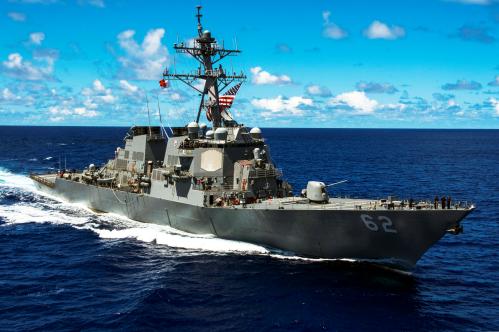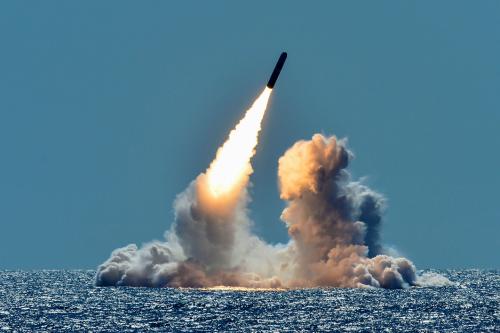It has been a rough few days for North Korea’s new leader, Kim Jong-un. On the eve of the ceremony marking the centennial of “Eternal President” Kim Il-sung’s birth, the catastrophic failure of a rocket designed to put a satellite into orbit cast a pall over the festivities. Instead of trumpeting the stunning success of the launch as part of the celebrations―the original game plan―Pyongyang is dealing with the aftermath of the destruction of the launch vehicle, which fell into the Yellow Sea.
And now, just as the young Kim was preparing to celebrate his fourth month as leader following the mid-December death of his father, Kim Jong-il, the United Nations Security Council (UNSC) has rebuked him and threatened further action if Pyongyang again violates its international obligations.
The UNSC moved surprisingly quickly after the launch to agree on a Presidential Statement that “condemns” and “deplores” the launch and its consequences. It also tightened existing sanctions, demanded that the North give up its nuclear weapons programs, and declared that the Security Council will “take action accordingly in the event of a further DPRK launch or nuclear test.”
Pyongyang, which has some experience defying UNSC resolutions, will almost certainly reject this statement. But it cannot ignore the fact that China, its ally and frequent protector, endorsed the statement.
The toughness of the UNSC statement and the unanimity of the Council in approving it reflect the near-universal condemnation that greeted Pyongyang’s announcement of its plan to launch a satellite. In proceeding with the launch, North Korea has grossly misunderstood the mood and will of the international community.
Under its new leader, North Korea has managed in only a few short weeks to create an even more challenging international environment for itself than the one it inherited from the late Kim Jong-il.
The DPRK today looks foolish. Having focused the international community’s attention on the launch, the North seems to have forgotten that launches can also fail. This one did, under the watchful eye of the Northeast Asia region’s militaries and intelligence agencies, and with international journalists pursuing the story on the streets of Pyongyang, to the embarrassment and chagrin of their hosts.
North Korea may profess not to care about its global reputation, but the fact remains that its prestige has hit a new low. While we should hope that Pyongyang would be chastened by its setback, we cannot dismiss the possibility that it will respond by doubling down on its challenge to the international community, including by conducting a nuclear test.
Domestically, Friday the 13th was a very bad day for Kim Jong-un and his vision of celebrating the DPRK’s emergence as a “strong and prosperous nation.” Kim and his advisors had linked the launch scheduled for that morning to the centennial commemoration and to the Korean Workers’ Party conference that elevated the young leader to the top positions of the Central Military Commission, the National Defense Commission, and the Party itself.
In the end, the tremendous publicity the regime gave to the launch compelled it to acknowledge the failure publicly – an unprecedented step for a regime that prides itself on its perfection. One can only imagine what the North Korean people may be thinking today as they ponder this tear in the fabric of the regime’s infallibility.
Some suggest the failure may prompt the leadership to reconsider the path the nation is on. However, faced with this failure, some in the upper reaches of the regime are more likely making the case to Kim Jong-un that an alternative demonstration of the North’s military and technological prowess is now more important than ever.
In its relations with the United States, North Korea’s failed launch has damaged, probably fatally, the February 29th U.S.-DPRK agreement. That accord had offered a slight hope that some improvement in bilateral ties and progress in dealing with the nuclear issue might be possible.
Instead, North Korea’s announcement of a launch so soon after concluding the agreement simply reconfirmed to most observers that Pyongyang cannot be trusted.
The Obama administration was wise to construct the Leap Day Agreement as a test of North Korean seriousness and sincerity. The North failed that test miserably and the United States has wisely walked away from the accord.
Pyongyang has also damaged its ties with China. PRC efforts last month to convince North Korea not to announce the launch were flatly rejected. And China’s attempts to dissuade Pyongyang from carrying out the launch were similarly brushed aside.
Pyongyang also seemed oblivious to the fact that China had voted in favor of the very UNSC Resolutions (1718 and 1874) that North Korea was preparing to violate with its launch. Perhaps the North Korean leadership assumed it would, once again, get a “pass” from Beijing.
As Pyongyang reflects on its post-launch diplomatic and political environment, it cannot ignore the fact that it has done itself damage. It has tried the patience of its only international defender. It has further alienated the United States and probably killed any near- or medium-term prospects for renewed negotiations with Washington.
Pyongyang’s launch has prompted the UN Security Council to signal its intention to act strongly in response to new violations by the North.
The decision to launch a satellite was almost certainly one that was made months ago, on the watch of Kim Jong-il. But in implementing this game plan and by listening to the advice of his generals, Kim Jong-un has presided over a public humiliation of his country. His prestige has been damaged, probably including in the eyes of his own people.
This situation now presents an important test of his leadership. How will Kim Jong-un respond? Will he continue to follow the policies and recommendations of those who brought about this setback, or will he opt for a different path?
While one hopes that Kim will choose a non-confrontational path, precedent and the regime’s need to appear unbending suggest otherwise.
At a recent Track II dialogue in Germany, the DPRK delegation head warned that if the United Nations imposed sanctions or took other steps in response to a launch that “violate our sovereignty,” the DPRK would respond with unspecified measures of its own. The short list of responses almost certainly includes another nuclear test. We cannot rule out that this is exactly what Pyongyang will do.



Commentary
Op-edBitter Harvest: North Korea’s Challenges and Choices After the Launch
April 17, 2012